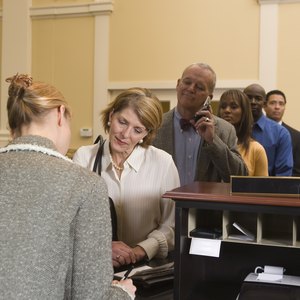
A bank account can provide a place to stash some cash for safekeeping while earning interest, but if you forget about your account for too long, your money may not be there when you need it. If a bank account has no activity for an extended period, it can be flagged as inactive or dormant. When an account remains inactive long enough, it can pass into the hands of state governments as unclaimed property.
Inactivity Fees
Banks accounts tend to come with long lists of rules and conditions that can tack on charges for all sorts of services and account activities. Your bank may charge inactivity fees if you don't use your account often enough. The federal government has a ban on inactivity fees for credit cards, but fees can be imposed on other types of accounts like savings, checking and stock-trading accounts.
Interest Payments
As of 2013, the Federal Deposit Insurance Corporation insures deposits of up to $250,000 that savers make at participating banks. To protect consumers, the FDIC sets a variety of rules that affect how banks operate. For example, banks are required to pay interest on funds held in an interest-bearing account even if a low level of activity allows the bank to consider the account inactive or dormant.
Unclaimed Property
If you let an account remain inactive for several years, your funds may end up in the hands of your state government. According to the U.S. Treasury Department, bank accounts typically pass to state governments when there is no customer initiated activity or contact for a period of three to five years. Specific rules for unclaimed property vary by state. Banks typically are required to try to contact you to give you chance to claim your cash before handing your account over to the state.
Claiming Property
When a state government takes control of an unclaimed bank account, it doesn't use the money to pad its own coffers. It simply holds the cash until the owner claims it. Each state has its own procedures you can use to find unclaimed property. The National Association of Unclaimed Property Administrators offers links to the unclaimed property offices in each state.
References
- FDIC: 6500 -- Consumer Protection
- U.S. Department of the Treasury: When Is an Account Considered Inactive or Unclaimed?
- U.S. Department of the Treasury: What Can You Tell Me About State Unclaimed Property Programs?
- USA.gov. "Unclaimed Money from the Government." Accessed Feb. 1, 2020.
- Washington State. "Unclaimed Property: General Information." Accessed Feb. 1, 2020.
- U.S. Securities and Exchange Commission. "Escheatment Process: Accounts -- Abandoned and Unclaimed." Accessed Feb. 1, 2020.
- National Association of Unclaimed Property Administrators. "What is unclaimed property?" Accessed Feb. 1, 2020.
- Office of the New York State Comptroller. "Annual Report of the Office of Unclaimed Funds," Page 1. Accessed Feb. 1, 2020.
- The New York Times. "There Are Billions in Unclaimed Assets Out There. Some Could Be Yours." Accessed Feb. 20, 2020.
- New York State Comptroller. "Office of Unclaimed Funds Fact Sheet." Accessed Feb. 20, 2020.
- Texas Comptroller of Public Accounts. "Texas Comptroller Announces Record $308 Million in Unclaimed Property Returned in Fiscal 2019." Accessed Feb. 20, 2020.
- PressConnects. "Unclaimed Funds: Most less than $100, but one Connecticut resident got missing $32.8 million." Accessed Feb. 20, 2020.
- Internal Revenue Service. "Where's My Refund?" Accessed Feb. 20, 2020.
Resources
Writer Bio
Gregory Hamel has been a writer since September 2008 and has also authored three novels. He has a Bachelor of Arts in economics from St. Olaf College. Hamel maintains a blog focused on massive open online courses and computer programming.

